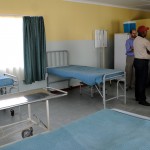November 7th, 2008
Black Liberation | Lived Experiences | Memorials | Music
Lived Experiences in South Africa
 The lived experiences research topic examined the effects of apartheid on ordinary people and focused on education and health care in King William’s Town, South Africa. The research team conducted the majority of the interviews at the Zanempilo Health Clinic in Zinyoka Location, a rural area close to King William’s Town. Every narrator was in some way involved with the Black Consciousness Movement and/or the creation of the health center. Respondents included a gardener, a cook, a caretaker, and the current administrator of the clinic, Sister Tshazibana. Often, histories only include the perspective of prominent members of society; rarely is the story of the gardener or the nurse ever brought before the public. This research allows empowerment, verbalization, and amplification of the silenced voices of those who make up the greater part of the population.
The lived experiences research topic examined the effects of apartheid on ordinary people and focused on education and health care in King William’s Town, South Africa. The research team conducted the majority of the interviews at the Zanempilo Health Clinic in Zinyoka Location, a rural area close to King William’s Town. Every narrator was in some way involved with the Black Consciousness Movement and/or the creation of the health center. Respondents included a gardener, a cook, a caretaker, and the current administrator of the clinic, Sister Tshazibana. Often, histories only include the perspective of prominent members of society; rarely is the story of the gardener or the nurse ever brought before the public. This research allows empowerment, verbalization, and amplification of the silenced voices of those who make up the greater part of the population.
(Photo Copyright © 2010, Ryan Koons)
Podcast: Lived Experiences: Health Care in South Africa
Created by Tiffany Mane and Flosha Tejada
[kml_flashembed movie="http://www.youtube.com/v/4Wmed-XhiKM" width="425" height="350" wmode="transparent" /]
Lived Experiences in Mississippi
This section of the project focused on the progression of education and health care from segregation to the post-Civil Rights era in Coahoma County, Mississippi. However, the key focus was on education. The goal was to gather the experience of those who attended segregated institutions, or experienced the era when schools were desegregated.
As a result of the low investment in black schools, the quality of education and services was relatively poor. Things such as books and sports uniforms in African-American schools were usually old and worn, as they had been passed down from white schools. In many cases, these items were not even available. The post-Civil Rights era aimed at correcting these educational discrepancies. One of the major programs established to do this was Head Start.
Head Start is a program of the United States Department of Health and Human Services that provides comprehensive education, health, nutrition, and parental involvement services to low-income families. It later continued under the Department of Education and focused on assisting students who needed extra help before entering school–for instance children who were four and five years old. Consequently, when these children finally matriculated, they were ahead of students who had not gone through this or a similar program.
Funding for Head Start came from the federal government. In Coahoma County, one of the first counties to implement the program, Head Start was established in the summer of 1965. A year or so after that, another organization called Coahoma Opportunities, Inc. was formed and became the umbrella organization of the Head Start Program.
Currently, the biggest Head Start operation is located in Clarksdale. In addition to the provision of educational services, parenting advice, and health care, the Head Start program became one of the major employers in Coahoma County.
The Head Start program also helped the country to move towards integration because other grants, such as the Community Development Grants (CDG) accompanied it. Through these grants, community organizers could be hired for purposes of coordinating community development. Moreover, a board, which was required to be biracial, had to be formed and given the duty of overseeing the proper utilization of these funds so that the county could receive these funds.
These programs, especially those dealing with education, are still striving to combat the challenges and legacy of segregation. They attempt to include those who have for so long been excluded from quality education, as well as to provide them with opportunities to obtain for what they desire. With the Head Start program, community development projects have been on the rise, and racial relations continue to improve. However, due to the length and intensity of segregation in the south, there is still a long way to go before the African-American community reaches the same point as the white community in Coahoma County, as well as in all of Mississippi.
Podcast: Mississippi Lived Experiences
Created by Tiffany Mane and Flosha Tejada
Podcast: Sharecropping in the Mississippi Delta
Created by Corinthia Jacobs
[kml_flashembed movie="http://www.youtube.com/v/kOyF88zkMJQ" width="425" height="350" wmode="transparent" /]